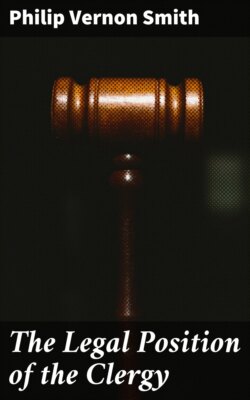Читать книгу The Legal Position of the Clergy - Philip Vernon Smith - Страница 14
На сайте Литреса книга снята с продажи.
Оглавление8. Under the Colonial Clergy Act, 1874, a priest or deacon (i.) not ordained by an English or Irish or Scottish bishop, or a bishop acting on the request and under the commission of an English bishop, or (ii.) ordained for service out of the British dominions or for service in the colonies by either of the two archbishops or the Bishop of London,[12] (a) cannot, unless he holds or has held preferment or a curacy in England, officiate in any church or chapel in England without the written permission of the archbishop of the province, and without making and subscribing a declaration similar to the Declaration of Assent prescribed by the Clerical Subscription Act, 1865;[13] and (b) is not entitled to be admitted to any preferment or to act as curate in England without the previous consent in writing of the bishop of the diocese. But a person who holds preferment or a curacy in an English diocese under the Act of 1874, and who has held preferment or acted as curate for a period or periods exceeding in the aggregate two years, may, with the written consent of the bishop, request from the archbishop of the province a licence to exercise his clerical office according to the provisions of the Act; and this licence, if issued by the archbishop and registered in the provincial registry, will place him in the same position as if he had been ordained for service in England by an English bishop.[14] Moreover, a clergyman ordained by a bishop of the Scottish Episcopal Church, unless he holds or has previously held preferment in England or Ireland, (a) is liable to a penalty if he officiates in England more than once within three months without notification to the bishop of the diocese, or if he officiates contrary to an injunction of the bishop; and (b) is not entitled to be admitted to any preferment in England without the bishop's consent, which he may withhold without assigning any reason; and (c) before being admitted or licensed to any preferment or curacy in England, must make and subscribe before the bishop of the diocese, the Declaration of Assent prescribed by the Clerical Subscription Act, 1865.[15]
